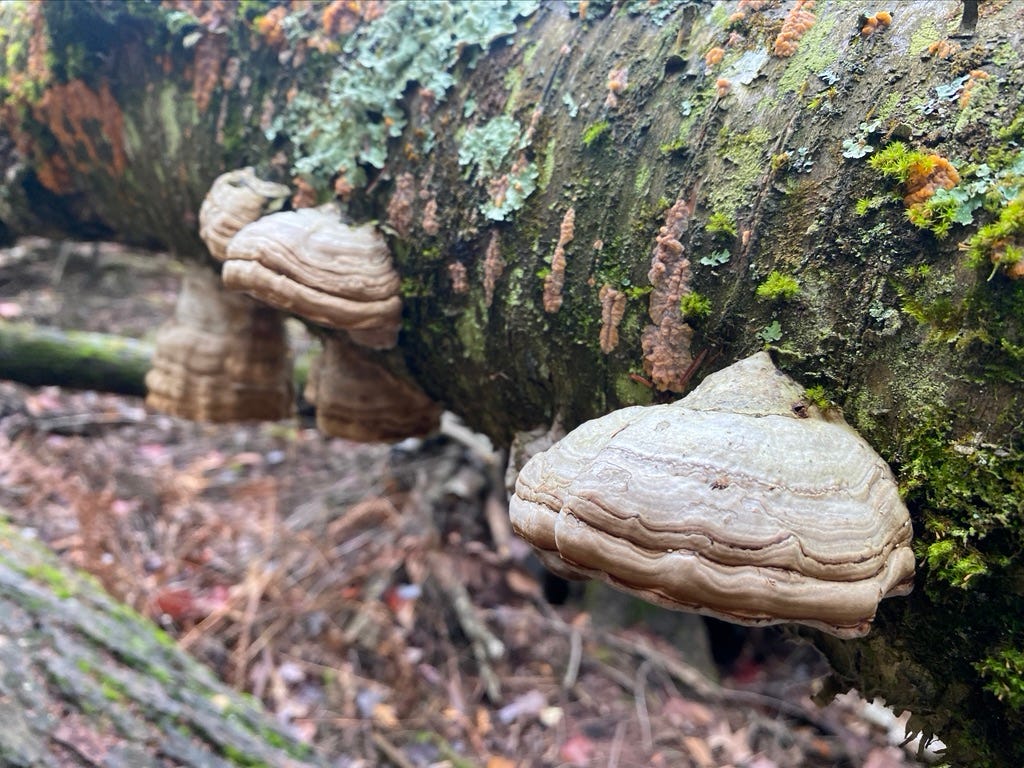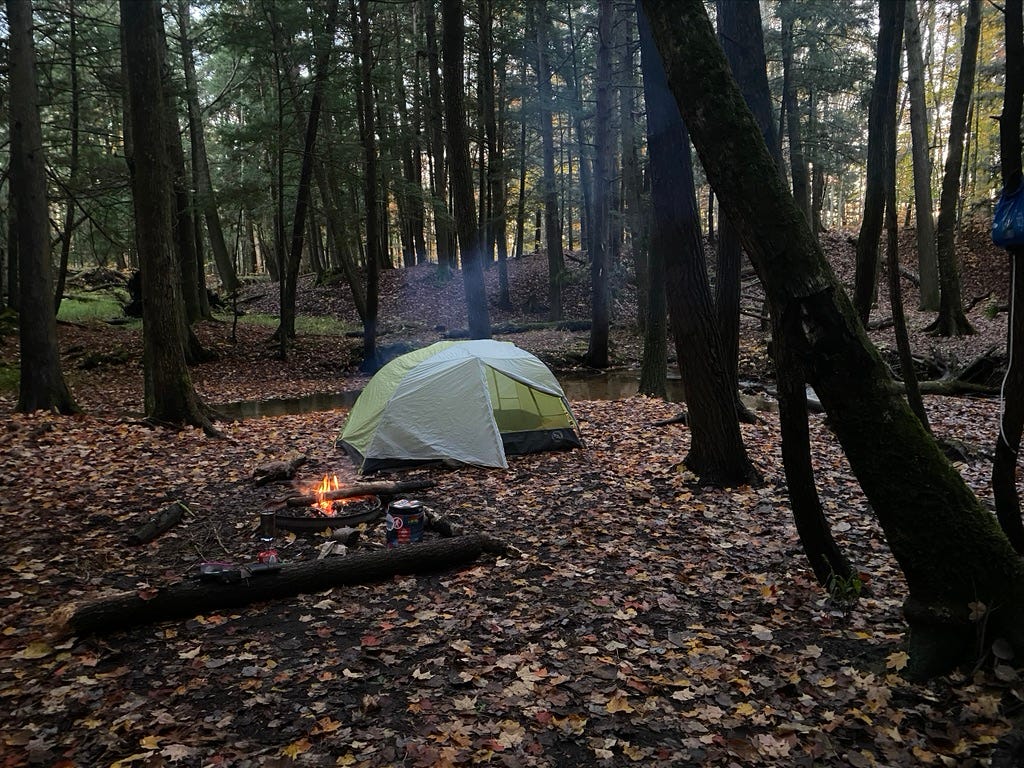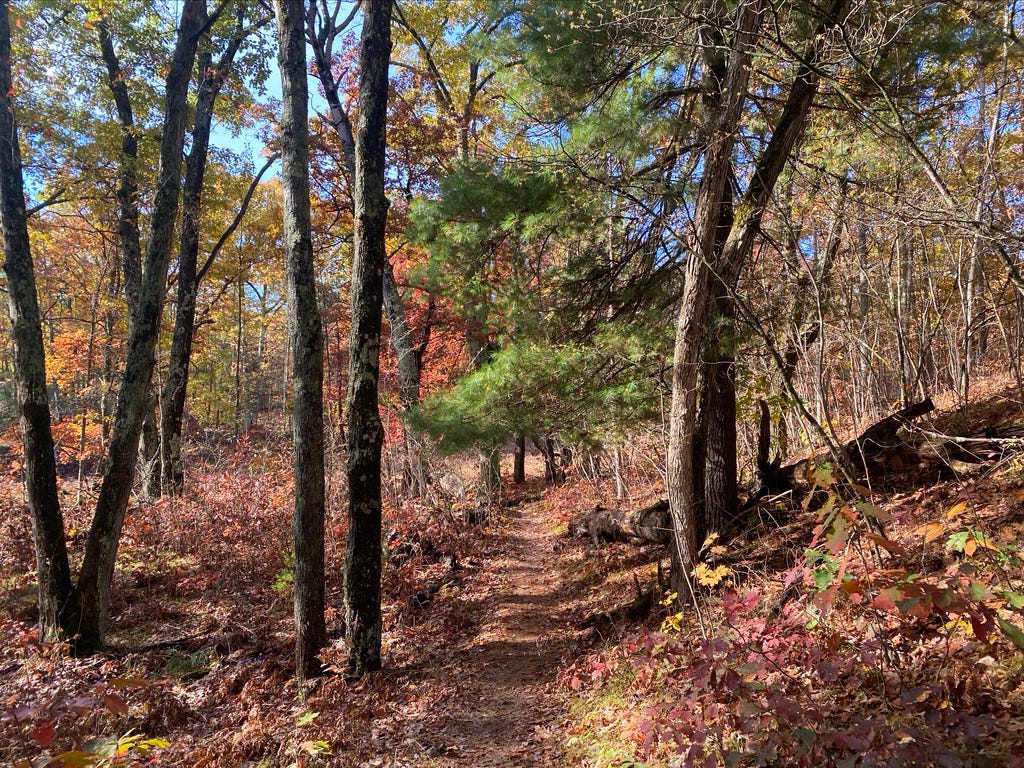Frighten Me Into The Present
Notes on gathering ground to oneself.
A few weeks ago I went backpacking in Michigan for the first time, up in the northwest corner of the mitten. The pinky, I guess.
Despite the cold of the season, there were plenty of people out on trail. It is Michigan, after all, which is full of Michiganders. But by the time night fell, at all of 6:30 pm, I was totally alone.
I don’t mind this, really. Or it’s not that I don’t mind, but that the minding is part of what I go out there for in the first place. It gives me the willies, at least a little bit, each time I sleep out in the woods alone. And that’s alright. There’s a fragment of a line from Jack Gilbert’s “I Imagine the Gods” that I’ve come back to for years and years, wherein the poem’s speaker begs his deities: frighten me into the present.
That’s what I’m looking for out there. The presentness more than the fright, but if one’s the cost of admission to the other, it’s a relatively small price to pay. Curled up there in my tent, looking at my own breath in the light of my headlamp and drifting between wakefulness and sleep from sundown to sunrise, I always remember: this place belongs to them. Them being what hiker and author Carrot Quinn calls stickbreakers. The various little scurrying things that surround you in the woods at night, by virtue of the fact that they live there. They thrive there.
The night lands belong to them, not only spatially but temporally: they’re meant to be out and about in the hours when I am in my sleeping bag wondering about them. I can’t see a thing in the dark. What little power of hearing or smell I have is rendered meaningless by the creek next to which I’ve pitched my tent. All I can hear is creek. All I can smell is cold.
Barry Lopez, in his seminal Arctic Dreams, notes that the Inuit of northwest Greenland name the polar bear not for its color, its ferocity, or its position as the local apex predator. Instead they call the bear pisugtooq, “the great wanderer.” Lopez, after a long season spent watching them traverse and den within the frozen north, boils down the life of these creatures to a few words:
Gathering ground to themselves. Navigating. Wandering with purpose.
Polar bears themselves may be among the world’s greatest terrestrial wanderers,1 but this is what all the night critters are out there doing while I toss and turn on my pricey ultralight sleeping pad. Gathering ground to themselves. Navigating. Wandering with purpose. I represent, at most, a brief interruption in their well-trod paths, an interesting set of smells to check out (and maybe pilfer from). Me, I have animal parts, but have largely been insulated from animal concerns,2 and so the act of gathering ground to myself requires, among other things: intention, planning, failure, fear.

The value in this proximity to and awareness of other types of life in the outdoors is something that I return to whenever I read Hal Borland’s work, which is nearly every day. (Someday I’ll have to stop quoting him in this newsletter, but I don’t see that happening soon.) Borland wrote often about the realities of pastoral life, and so any romance in his writing comes tinged with the authority of experience. In This Hill, This Valley, Borland speaks of growing—and killing—one’s own food as critical acts in knowing the origins of things:
Living close to origins here, we are seldom unaware of cause and effect. It seems to me that any way of life remote from origins has a weak spot in its foundation, just as any way of thinking which deals with effects without knowing causes is at fault.
Well, I have no farmland. I do have a shared yard and a shared garden, which is a start. My wife and I slept with the window open into the first week of November, so that the sounds and the breeze of the night lands might remain available to us as long as we could bear it. And sleeping out, on the ground or in a hammock, as often as I can, brings me even closer to the life I want to live. Though I am no farmer, that’s all I want, in the end: to live closer to cause and effect.
Thanks, as always, for reading. I’ll talk to you next time.
-Chuck
PS - If you liked what you read here, why not subscribe and get this newsletter delivered to your inbox each week? It’s free and always will be, although there is a voluntary paid subscription option if you’d like to support Tabs Open that way.
Lopez references one collared polar bear that turned up in Nanortalik, Greenland, a year after being tagged in Svalbard—a distance of some 2,000 miles.
Largely, not entirely. I appreciate Daylight Savings, even as it disrupts my life and everyone else’s, for the reckoning it forces, for its required acknowledgment that building a society which counts time differently from the way the planet counts time has some real consequences for us.




Beautiful